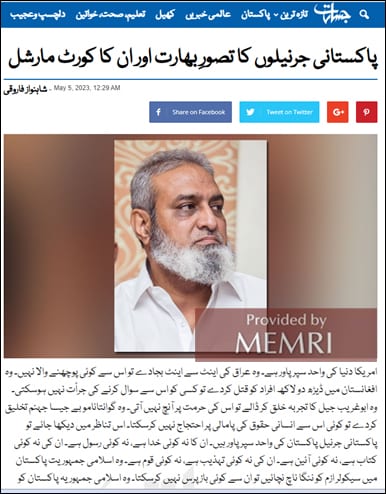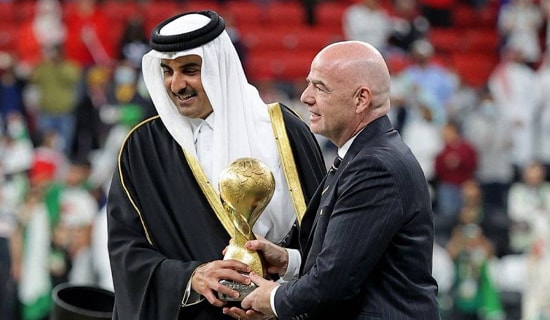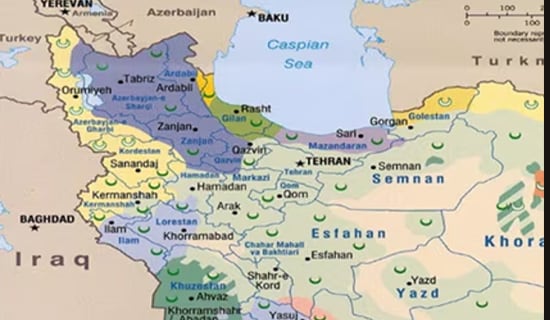A recent column titled "Pakistani Generals' Idea Of India And Their Court Martial" and written by Shahnawaz Farooqui in the Urdu-language Pakistani newspaper Roznama Jasarat, which is a pro-Islamist daily published by Jamaat-e-Islami Pakistan, questioned the Pakistani military generals' stances toward India and toward the people of Pakistan.

A screenshot from Shahnawaz Farooqui's column
The column was written in the context of a balance-of-payment crisis that has put Pakistan on the brink of international default and a continuing political deadlock in which the Election Commission of Pakistan has refused to hold elections in provinces, saying it lacks funds, while the Shahbaz Sharif government has declined to give parliamentary approval for funds to be released, and the army, acting in tandem with the government, has said it cannot provide security for the elections.
This has created a constitutional crisis in which a Supreme Court of Pakistan order to hold elections has been practically defied, while the military, the government, and the provincial governors, who have the power to recommend the initiation of the election process, continue to ignore a demand by the pro-Islamist former prime minister Imran Khan, arguably the most popular political leader in Pakistan, to hold an election. Meanwhile, the government of Prime Minister Shahbaz Sharif has filed corruption charges against Imran Khan.
On May 12, 2023, in an move that the Supreme Court of Pakistan declared illegal, paramilitary forces arrested Khan from a courtroom. Following his release, Khan blamed Pakistan army chief General Asim Munir for organizing the arrest. In an interview, Khan said: "It's not the security agencies. It's one man, the army chief. There is no democracy in the army. The army is getting maligned with what is happening... and [the army chief] is worried that if I come to power, I will de-notify him. Which, I tried my best to send him a message, I will not. All this is happening on direct orders from him."[1]
In his column, published a week before Khan's arrest, Shahnawaz Farooqui went on to discuss how the Pakistani army has always acted against its own people and has never been held accountable, also criticizing a secret attempt by former Pakistani army chief General Javed Bajwa, General Asim Munir's predecessor, for trying to work out a deal with India without informing the then government of Imran Khan, allegedly in the hope of getting a Nobel Prize for peace for resolving the Kashmir dispute.
Following are translated excerpts from Shahnawaz Farooqui's column:[2]
"America Is The Only Superpower In The World; If It Destroys Iraq Brick By Brick, No One Will Question It; If It Kills 150,000 People In Afghanistan, No One Can Dare To Question It"
"America is the only superpower in the world. If it destroys Iraq brick by brick, no one will question it. If it kills 150,000 people in Afghanistan, no one can dare to question it. If it creates the experiment of Abu Ghraib prison, its honor will not be affected. If it creates a hell like Guantanamo Bay, no one can protest the violation of human rights.
"If you look in this context, Pakistani generals are the only superpower of Pakistan. They have neither God nor Messenger. They have no book, no constitution. They have no culture, no nation. If they dance naked with secularism in the Islamic Republic of Pakistan, then no one can question them.
"If they make the Islamic Republic of Pakistan a dance floor of liberalism, no one can say that they have done wrong. They violate the constitution whenever they want. They impose martial law whenever they want. They invent [politicians like Zulfiqar Ali] Bhutto, Nawaz Sharif, Altaf Hussain, and Imran Khan whenever they want."
"No Matter What Pakistani Generals Do, They Are Never Held Accountable"
"General MacArthur was America's greatest military hero in World War II. He occupied a vast territory and achieved amazing victories in the World War. The general idea was that he would contest the U.S. presidential election after his retirement and would easily become the president of America.

Imran Khan (left) and Pakistan Army chief General Asim Munir (right)
"But General MacArthur made only one political statement during the war. The American political leadership had asked General MacArthur to stop the advance of the army in certain areas [in the Koreas]. General MacArthur disagreed with the orders of the American political leadership while talking to the press. As a result, General MacArthur was recalled within 24 hours, and his entire military and potential political career came to an end.
"India's army is much larger than Pakistan's army, but so far no Indian general has had the courage to impose martial law in the country. Martial law is a big deal. No Indian general has even dared to make any political statement to date.
"But no matter what Pakistani generals do, they are never held accountable. This is the reason Pakistani generals are always in the news."
"General Bajwa Became Very Angry And Said That Modi Has To Visit In April; What April Is This For Pakistan, April 2021"
"A few days ago, Hamid Mir, a well-known journalist of the country, made several revelations regarding General [Qamar Javed] Bajwa on a [television] program hosted by Naseem Zahra. I wish Hamid Mir had made these revelations when General Bajwa was the army chief. But even in the current situation, these revelations are important in many respects. See what Hamid Mir said in his own words.
"Naseem Zahra: What are you doing on Kashmir?
"Hamid Mir: I can only pray for Kashmir because the details of the deal General Qamar Javed Bajwa made have not yet been revealed to the public. I used the word – 'deal.' Immediately after the Pulwama attack [in February 2019], [Indian Prime Minister Narendra] Modi was planning to visit Pakistan.
"When the Foreign Office found out, [then] Foreign Minister Shah Mahmood Qureshi found out that Modi was coming to Pakistan and I [Qureshi] did not know about it, so he ran to [Prime Minister] Imran Khan and asked him, 'Do you know?'
"Imran Khan said, I was informed, Bajwa Sahib and Faiz Sahib [then Inter-Services Intelligence chief Lt.-Gen. Faiz Hameed] had come. There are talks going on with [India's National Security Advisor] Ajit Doval, but I didn't know if he is coming.
"Then Imran Khan told Faiz Sahib: you should take the Foreign Office on board. So, after that, General Bajwa came to the Foreign Office with his entire team and paraphernalia (it was the same lecture that he had once given to me and you as well, saying) that tanks are not suitable for movement, and I don't have diesel for troop movement. These were the kind of discussions.
"Nasim Zehra: Normally, shouldn't an army chief face a court martial for this? I have to say now; I've been saying it in back rooms; it doesn't work like this.
"Hamid Mir: By having 20, 25 journalists sit in front of you, you are telling them that the Pakistan army is not capable of fighting.

Former Pakistan Army chief General Qamar Javed Bajwa
"Nasim Zehra: Does that mean that telling this to 25 journalists would remain with them...?
"Hamid Mir: Even at that time, we were sure, he was telling a lie. This is about the auditorium where the Corps Commanders' conference is held. We were being told [a fake] story while sitting there that the army is not capable of fighting India, so we should make peace.
"Now, he gave the same lecture to our Foreign Office, which was given to you and me; so, the Foreign Office confronted him. Shah Mehmood Qureshi Sahib did a wonderful thing that he – not only got his Foreign Office secretary to sit but also called five or six ex-secretaries to sit at that meeting, who said that this is India's trap and what you are saying goes against Pakistan's traditional position and it does not match our national interest. General Bajwa became very angry and said that Modi has to visit in April. What April is this for Pakistan, April 2021."
General Bajwa "Was Of The Opinion That 'This Is A Big Mistreatment Of Me [By The Imran Khan Government], I Wanted To Receive The Nobel Peace Prize, By Solving The Kashmir Issue'"
"Nasim Zehra: They have compromised on Kashmir and yet.
"Hameed Mir: Yes, this was on August 5, 2019, and Bajwa sahib had also fixed the date of Modi's visit to Pakistan through General Faiz and Ajit Doval. So, there were differences with Imran Khan sahib on many matters [leading to his ouster from the government], so there were differences in this matter as well. He (General Bajwa) was of the opinion that, 'this is a big mistreatment of me [by the Imran Khan government], I wanted to receive the Nobel Peace Prize, by solving the Kashmir issue.'
"Naseem Zahra: By General Bajwa?
"Hamid Mir: Yes. And another extension was to be taken [as army chief].
"Now, Shah Mehmood Qureshi may not talk about it, or Imran Khan may not talk about it... I asked Shah Mehmood Qureshi about these things, and he confirmed them. But he also said that unless the chairman [Imran Khan] gives me permission, I cannot speak on it because it falls under the category of state secret."
"The History Of Pakistani Generals Is That They Always Surrender To The Enemy And Target Their Weapons On Their Nation"
"You saw a glimpse of General Bajwa's treachery in this conversation between Hamid Mir and Naseem Zahra. On the one hand, they are telling the whole world through journalists that the Pakistani army is not capable of fighting a war with India. Its tanks are not operational, its army does not even have money to buy gas for transportation, so surrendering to India is the best solution to the problem.
"The history of Pakistani generals is that they always surrender to the enemy and turn their guns on their nation. Our generals surrendered to India in 1971; long before that, General Ayub [Khan] had surrendered to America, becoming a part of the American camp.
"And even the rulers of Afghanistan, Hamid Karzai and Ashraf Ghani, repeatedly threatened Pakistan, but Pakistani generals could not do anything against them. Once Iran's General [Qassem] Soleimani also threatened to teach Pakistan a lesson, but Pakistani generals remained silent."
"The Pakistani Generals Tried To Crush The Bengali Majority By Force [In East Pakistan, Leading To The 1971 War In Which Bangladesh Was Created]"
"However, the Pakistani generals tried to crush the Bengali majority by force [in East Pakistan, leading to the 1971 War in which Bangladesh was created]. They conducted five military operations in Baluchistan. They used force in rural Sindh during the Movement for the Restoration of Democracy.
"The military operation in Karachi turned the MQM [Muttahida Qaumi Movement] from oppressor to the oppressed. However, during the Karachi operation, ordinary citizens were greatly humiliated. When the army conducted an operation in the Saudabad [area of Karachi], they brought all the men of many streets onto the road and took off their shirts and tied them over their eyes.
"One night we were returning home from a wedding ceremony with our family when our taxi was stopped by the soldiers who searched the taxi for a long time despite the presence of women in the taxi. In those days we used to smoke cigarettes and we had a matchbox in our hand. Seeing this, a soldier came to us and asked a sudden question. He said 'what is in this matchbox?' We said, 'There is fire in the matchbox.' The soldier stared at us for a long time and then we were allowed to go."
Pakistani "Generals Handed Over The Lists Of All The Underground Workers Of The [Punjab Secessionist] Khalistan Movement To India"
"The Pakistani nation considers India as its biggest enemy and India has tried to erase Pakistan from its existence since the creation of Pakistan till today. But this entire history has no effect on the hearts and minds of our generals.
"This is the reason why our generals' idea of India is different from the Pakistani nation's idea of India. It was the Pakistani generals who organized the Khalistan movement in Indian Punjab [the Sikh secessionist movement in the 1980s]. If this movement had continued, then Indian Punjab would have been separated from India, but our generals handed over the lists of all the underground workers of the Khalistan movement to India.
"And they blamed it on the Interior Minister of the People's Party government Chaudhry Aitzaz Ahsan. But Chaudhry Aitzaz Ahsan said in a newspaper interview that he could not have survived such a big betrayal [had it been true]. General Pervez Musharraf was once the 'hero' of the Kargil [War in 1999], but then the same General Pervez Musharraf started begging for talks with India on a daily basis."
"The Generals Who Have Become 'Lions' For The Nation Are The Same Generals Who Are Standing As 'Jackals' In Front Of India"
"India begged General Pervez [Musharraf] for negotiations under the pressure of the United States, but General Musharraf was removed from Pakistan's principled position in relation to Kashmir.
"Now Hamid Mir has revealed that General Bajwa, while India had ended the special status of the occupied Kashmir [by abrogating Article 370 of the Indian constitution], was secretly holding talks with Indian Prime Minister Modi, who is like a monster, to smooth the way for travel to Pakistan. And he was doing this without even taking [then Prime Minister] Imran Khan into confidence.

From left to right: Hamid Mir, Narendra Modi, Imran Khan, Javed Bajwa (image: Twitter)
"These examples prove that the generals who have become 'lions' for the nation are the same generals who are standing as 'jackals' in front of India. There was a time when Quaid-e-Azam [literally" Great Leader," a reference to Muhammad Ali Jinnah, who is considered the founder of Pakistan] was not afraid of India despite the country, army and no atomic bomb, and [now] there is a time when we have a state, the seventh-largest army in the world, an atomic bomb, and long-range missiles, but our generals are afraid of India.
"Naseem Zahra has said in the conversation with Hamid Mir that General Bajwa should be court-martialled. This demand is 100 percent correct, but the history of generals is in front of us. Our generals broke all records of cowardice in the 1971 War [by surrendering before India]. So, 90,000 soldiers surrendered to India.
"When the Hamoodur Rehman Commission was formed [after the 1971 War], it recommended a court martial of many generals, including General Yahya [Khan], but the generals who broke the country and surrendered to India never had a court martial. And we are sure that even General Bajwa will not be court-martialled, General Bajwa whom [late secessionist Kashmir leader] Syed Ali Geelani described as more dangerous than Pervez Musharraf."








